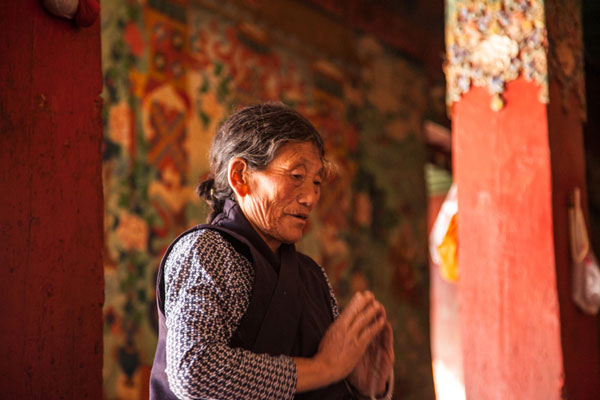 |
|
Believer of Tibetan Buddhism prays at Champa Ling Monastery. [Photo by Yuan Yong/Provided to chinadaily.com.cn] |
Traditional activities resume
The highest honor for monks such as Tsering is to pass the exam and receive the Geshe Lharampa – the highest academic degree in the Gelukpa school of Tibetan Buddhism.Monks conduct religious logics debates during one exam, held annually at Jokhang Temple. As a traditional religious activity, the Geshe Lharampa exam was stopped due to the "cultural revolution" (1966-76) but has resumed since 1986.
"The system of religious learning and traditional religion activities has resumed, such as the Geshe Lharampa debate in Jokhang Temple Pilgrims love it very much," said Lhakpa, the official from the ethnic and religious affairs commission, adding that Tibet now has more than 80 monks with the degree.
Geshe Lharampa represents the highest level of attainment of monks of Tibetan Buddhism.
In Tashihunpo many traditional ritual activities are held annually.
About 20 percent of monks at Tashihunpo have laptops, and more have iPads, which are used to film many ritual activities in the monastery, said high-ranking lama Kachen Buchung at Tashihunpo.
Not only big and influential monasteries have received benefits, smaller ones too.
Lingbu Monastery is small and located in Gyangze county, Xigaze prefecture-level city with 17 monks including one living Buddha and 16 monks.
The most important annual ritual at Lingbu is the Cham dance Festival, held on the 10th day of the fifth month according to the Tibetan calendar.
This year, about 2,000 pilgrims took part on June 26, said Gelek Gyatso, a monk master and the lead chanter at Lingbu.
"There were too many people and we have to renovate and expand the courtyard for safety reasons," Gelek said.
When Gelek came to Lingbu as a monk in 1990 at 16, the Cham dance Festival had been stopped because of the "cultural revolution".
It was resumed only in 1994, when nearly 1,000 people took part and numbers have increased each year.
Local government supported the activity and invested 870,000 yuan to renovate and expand the courtyard, he said.
Related Stories